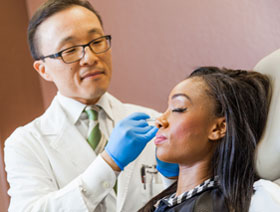 Have you ever said to yourself: If I ignore it…it will clear up in a few days?
Have you ever said to yourself: If I ignore it…it will clear up in a few days?
This may work for a lot of things in life, including some skin complaints like minor rashes, or an occasional eruption of pimples.
In other cases, however, ignoring your skin complaint is just plain bad advice, and can be dangerous–even deadly–in the case of suspicious moles or growths.
When should you see a skin care professional for different types of skin issues?
Our recommendations are below.
Suspicious moles or growths
If you notice a suspicious mole or growth, waiting to see a dermatologist can put you in real danger. Moles that exhibit certain characteristics or that are changing over time could be melanoma, and should be assessed by a dermatologist right away. On average, one American dies every hour from melanoma. Early detection can be the difference between life and death.
Many skin growth do not turn out to be cancerous, or they may be a less aggressive form of cancer such as basal cell carcinoma or squamous cell carcinoma. Your doctor will be able to diagnose and treat both serious and minor skin growths. Even if your skin growth is a humble wart, a dermatologist is your best bet for getting rid of it as quickly as possible– and giving you peace of mind!
See a dermatologist if:
- A mole/growth exhibits the ABCDEs of melanoma
- A new growth appears that doesn’t go away within 2 to 3 weeks
- A mole/growth is changing in appearance
- You have any concerns whatsoever about a mole/growth
Rashes
Rashes are fairly common and can be due to allergies, illness, medications, sensitivity to products or chemicals, and even stress.
If your skin rash occurred after eating something, being stung by an insect, or shortly after taking a medication, and it is accompanied by swelling of the mouth, tongue or throat and/or difficulty breathing, you may be experiencing anaphylactic shock and require immediate emergency medical attention!
In a non-emergency situation involving a rash, it is best to contact a dermatologist if:
- The rash persists without improvement after 48 hours
- Over-the-counter remedies aren’t working
- The rash is spreading
- The rash is oozing or appears infected
- Blisters are visible
- The rash is painful
- The rash is accompanied by swelling, bleeding or peeling
- The skin affected by the rash is changing color
- The rash is interfering with normal activities
With the right treatment, most rashes clear up within a few days, and your dermatologist can help you understand why the rash appeared and how to avoid it or treat it effectively in the future.
Acne
Acne may not be considered a dangerous health concern, but chronic, unmanaged acne can have a profound impact on a person’s self esteem. Why suffer or watch your teen suffer the negative impacts of acne when a skin care professional can help?
Sometimes what you think is acne isn’t acne at all. Other treatable skin conditions such as rosacea or folliculitis can often be mistaken for acne.
We recommend seeing a dermatologist for acne if:
- There is no improvement in acne symptoms after using over-the-counter products consistently for three months
- The acne continues to get worse
- The acne is very inflamed, with nodules or cysts present
- The acne is causing depression or otherwise affecting the person’s mental health
Skin Aging/Cosmetic/Aesthetics
You may not think to go to a dermatology practice for wrinkles or other aesthetic skin concerns, but it is a good idea. The proverbial “fountain of youth” is a multi-billion-dollar industry, which means there are many competing messages, false claims, and expensive-but-useless products out there, and it is hard to tell fact from fiction. With all of the confusion, why not consult with professionals who know the true science behind skin care and anti-aging?
On top of that, dermatology practices can sell medical grade skin care products that are stronger and more effective than those you can buy at a drugstore. That means you get a more potent product that will get you better results, as well as the benefit of a doctor who can make the best recommendation for you based on your medical history and skin type. There are also in-office dermatological procedures such as chemical peels, laser and light treatments, fillers and injections that can help you reach your aesthetic goals.
When should you see a dermatologist for cosmetic or aesthetic reasons?
- As soon as you consider purchasing an anti-aging product
- For skin care recommendations before those first wrinkles appear
- If you are considering any cosmetic procedure
- If you have any cosmetic concerns about your skin
Dermatologists are also the professionals to call for nail health, hair loss, or diseases such as psoriasis and eczema.
Have a concern about your skin? Call us for an appointment today.


